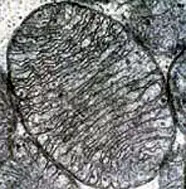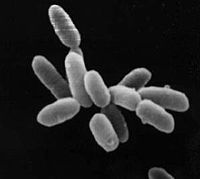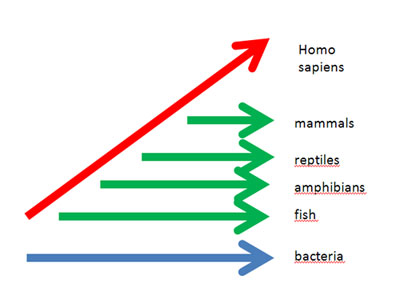|
TRANSLATE THIS ARTICLE
Integral World: Exploring Theories of Everything
An independent forum for a critical discussion of the integral philosophy of Ken Wilber
SEE MORE ESSAYS WRITTEN BY FRANK VISSER
Some Paradoxes
of Evolution
Frank Visser
We have published a lot about evoluton on Integral World in the past few years—albeit unsystematically and mostly in response to Wilber's statements on the subject. Some essential questions about evolution need to be addressed, that have at least me struck me as puzzling or contraditory.
For example, can we legitimately speak of "progress" in evolution? And if so, why is it that some organisms evolve towards greater complexity and some don't? Why do organisms evolve at all? From a different angle, why are there still ancient organisms around, such as amphibians and reptiles or fish? And the biggest question of all: what drives evolution—if anything at all? Is evolution in the end really only a matter of strife and struggle?
COMPETITION OR COOPERATION?
There is nothing like cooperation when it comes to beating the competition.
Phrases like "the survival of the fittest" or "the selfish gene" used in the literature on evolutionary theory seem to imply that it is strenght and selfishness that is favored during evolution. This, however, is a popular misconception. For one, "fittest" never meant to be the same as "strongest", but implies: being able to change, adapt. And even that is not true: it's not that those who can adapt, survive, but that those who turn out to be adapted—due to changed environmental circumstances—will survive.
And the selfish gene concept was never meant to convey that genes are selfish (genes can't have feelings, let alone selfish ones), but that only those genes that manage to be passed on to future generations, and in that sense can be called "selfish", are relevant for evolution. In this conception: the genes are where the action is. That could very well hold true for genes for altruism, if they ever would exist. But the point seems clear, in the popular understanding of evolution, competition rules, and whoever isn't competitive, is doomed.
 Mitochondrion
Mitochondrion
Some dissident biologists, however, stress cooperation as a major influence in evolution, if not the major one. The late Lynn Margulis opposed such competition-oriented views of evolution, stressing the importance of symbiotic or cooperative relationships between species. Her theory of endosymbiosis—the creation of multicellular organisms through the merging of primitive unicellular organisms and bacteria—is by now widely accepted. (These half-digested bacteria became our mitochondria—the energy factories in our very cells.) Which is not the case for her much wider assumption that symbiosis is the driving force behind complex evolution at large. Where Darwin traced the evolution of plants and animal species, Margulis clarified why there are plants and animals in the first place—a monumental contribution.
Evolution's Arrow by John Stewart offers another stimulating new point of view in the debate about what drives evolution: competition or coopration? His major point is that there is nothing like cooperation when it comes to beating the competition. It's competitive to be cooperative! As an example, we could also say, looking at the world of soccer: the best team wins from all the others. So the ability to cooperate may very well be one of the strongest factors in the struggle for survival—not in the least in the case of the human species, one of the most cooperative in existence. Stewart gives many examples of this process, from atoms joining to form molecules, unicellular organisms combining into multi-cellular organisms and individual human beings organizing into complex societies. For Stewart, this is one long process, unifying natural and cultural evolution.
PROGRESSIVE EVOLUTION: SOME DO, SOME DON'T
The striking difference between these two types of evolution needs to be noted.
Traditionally, biological organisms were divided into two main groups or kingdoms: plants and animals. In the past century funghi where added as a separate, third kingdom. Further research revealed there are at least 6 kingdoms now recognized: plants, animals, funghi, unicellular organisms—together forming the group of the eukaryotes or beings with a nucleus—bacteria and archaea (which stand somwhere in between the eukaryotes and the bacteria). These are grouped into three domains: Bacteria, Archaea and Eukaryotes. As biochemist Nick Lane writes: "The void between bacteria and eukaryotic cells is greater than any other in biology (2005, p. 27), in a chapter called "The Deepest Evolutionary Chasm". Where eukaryotes have a nucleus and have grown into multicellular organisms, bacteria have more or less stayed the same in shape and size, throughout billions of years.
 Archaea (Halobacteria)
Archaea (Halobacteria)
Apparently we need to distinguish between the "evolution" of bacteria, which took billions of years and is still in progress, and which did not produce any complex organisms, and the evolution proper, which did result in organisms of increasing complexity, such as plants, funghi and animals. (Contrary to popular knowledge, the largest multicellular organism is not the blue whale or even the Sequoia sempervirens, but the Honey Mushroom, covering 10 square km.)
Since bacteria still outnumber us Stephen Jay Gould was fond of saying that we actually still live in the Age of Bacteria. Many scientists assume that they will survive us human beings until the very end of earth's existence. The received view is that evolution started out with bacteria, and will end with bacteria as well, long after the complex organisms have disappeared from the face of the earth due to the Sun's heating up to become a Red Giant. Be that as it may, the striking difference between these two types of evolution needs to be noted: bacterial and eukaryote.
In their justified enthusiasm for the magnificent feats of bacteria, Margulis and Gould seem to downplay the equally impressive evolution of complex organisms—in my view, quite unnecessarily. Both epic evolutionary stories need to be told.
Stewart is acutely aware of the anomaly of bacterial "evolution" compared to the evolution of complex organisms. In his book he touches on the matter of bacteria:
Bacteria do present a considerable challenge to the case for evolutionary progress. It is impossible to argue convincingly that evolution is fundamentally directional and progressive without satisfactorily explaining the success of bacteria. (p. 306)
Contrary to Gould, Stewart holds that bacteria may have done well in the past couple of billion years, but this need not always be the case. If, as he speculates near the end of his book, human beings will (have to) leave planet Earth—as a kind of super-organism?—to find a new home in the galaxy, bacteria will be left behind (and only those bacteria that live in our bodies will be saved). Perhaps bacteria haven't yet found ways to realize their evolutionary potentials, such as we complex beings have done, he muses.
This seems to overlook that fact that there seem to be very real "barriers to complexity in bacteria", as biochemist Nick Lane (2005, p. 144-147) has described with so much clarity and detail. I am paraphrasing here: bacteria breath directly through their cell walls—lacking organs such as lungs—and growing bigger than their neighbors makes their respiration less and less energy efficient. It's simple math: when an organism grows in size, its surface grows by a power of 2, while its content grows by a power of 3. So the surface/content ratio goes down. Respiration cannot keep up with the growth in volume. In bacteria-country, it is the fastest dividers that survive, so bacteria will always have to remain small in size to stand up to the competition.
It's only when bacteria entered into a symbiotic union with some primitive unicellular organisms that progressive evolution could get off the ground. Cells of eukaryotes can harbour many hundreds of mitochondria, the earlier bacteria now subsumed into the cell, so that cell respiration continues to work efficiently even if the organism grows in size, up to the mighty dinosaurs.
STAGNATION AND ACCELERATION
Evolutionary stasis or stagnation seems to be the rule, acceleration the exception.
Then there's a third puzzling phenomenon in evolution, that has always struck me as crying out for an explanation: why is it that species and even whole phyla remain in existence, even when evolution has "moved on"? Why didn't all fish become amphibians? Why didn't all amphibians become reptiles? Why didn't all reptiles become mammals? And so on: why didn't all chimpanzees become human beings? What was holding them "back"? Or alternatively, what pushed some of them "onwards"? Apparently, there's nothing wrong with fish, evolutionary speaking, since they are still around in abundance (that is, if we don't catch them all for consumption). Of course, these statements are full of assumptions about how evolution should proceed or not.
 Fig. 1 - Three mysteries of evolution:
Fig. 1 - Three mysteries of evolution:
(1) Why some organisms don't evolve towards complexity (blue),
(2) Why some organisms move on towards complexity (red) and
(3) Why some organisms seem to stop at intermediate stages (green).
Evolutionary stasis or stagnation seems to be the rule, during long, long ages in which nothing seems to change within a species, and acceleration the exception. This has become known as "punctuated equlibrium", or punk eek for short. Only rarely, but decisively, a species transforms into another one. Looking backwards in time this may have happened suddenly, but of course, it could still have taken millions of years.
If there's a driving Force behind all of evolutionary life, as spiritualists like Ken Wilber ("Eros in the Kosmos") and Andrew Cohen ("the God impulse") argue, the burning question then becomes: why didn't everything evolve? Why only some species? For example, why didn't all fish go onto the land, if that was such a good design-idea? Was this Force not strong enough to influence all of life? Or was it directed towards only some of the species around? This doesn't seem a very plausible scenario, unless one wants to believe in some updated from of creationism.
But if there isn't such a Force, as science holds, the opposite question arises: why did anything evolve at all? Why did only some species evolve towards higher complexity? Natural selection seems to explain this. But even if evolution through natural selection (for eukaryotes) is true, why didn't bacteria go down that road? Apparently, they did not evolve because the natural barriers are too high. Only the symbiosis of bacteria and primitive unicellular organisms managed to take that barrier.
And the rest is evolutionary history.
REFERENCES
Stephen Jay Gould, Planet of the Bacteria, 1996. (The Unofficial Stephen Jay Gould Archive)
Nick Lane, Power, Sex, Suicide: Mitochondria and the Meaning of Life, Oxford: Oxford University Press, 2005.
John Stewart, Evolution's Arrow: The Direction of Evolution and the Future of Humanity, Canberra: The Chapman Press, 2000.
|

 Frank Visser, graduated as a psychologist of culture and religion, founded IntegralWorld in 1997. He worked as production manager for various publishing houses and as service manager for various internet companies and lives in Amsterdam. Books: Ken Wilber: Thought as Passion (SUNY, 2003), and The Corona Conspiracy: Combatting Disinformation about the Coronavirus (Kindle, 2020).
Frank Visser, graduated as a psychologist of culture and religion, founded IntegralWorld in 1997. He worked as production manager for various publishing houses and as service manager for various internet companies and lives in Amsterdam. Books: Ken Wilber: Thought as Passion (SUNY, 2003), and The Corona Conspiracy: Combatting Disinformation about the Coronavirus (Kindle, 2020). 

